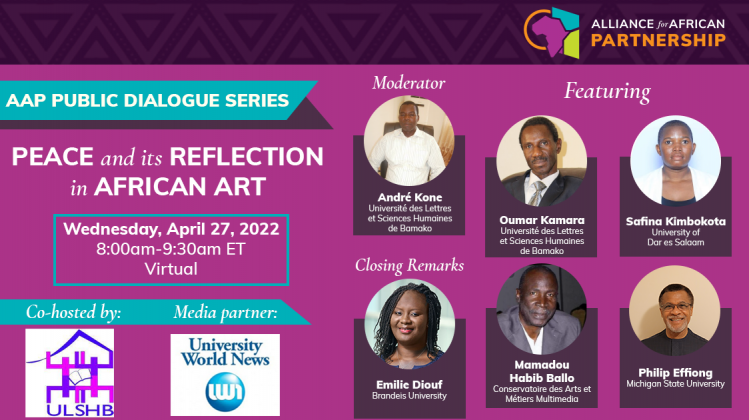
Wednesday, April 27, 2022
8:00am-9:30am ET
12:00pm-1:30pm GMT
Event Co-hosts: Université des Lettres et des Sciences Humaines de Bamako (ULSHB)
Media Partner: UWN
Moderator
Lecturer
Université des Lettres et Sciences Humaines de Bamako
Dr André KONE is a lecturer and researcher at the University of Letters and Human Science of Bamako. He holds two master degrees: in foreign languages and Russian literature and in Educational Leadership. In 2013, he was conferred on a PH.D in English at University of Education, Winneba, Ghana. Dr KONE works in a diversity of research areas: extensive reading, Bwa proverbs, gender and diversity, organizational theory, change theory, and translation, among others.
Dr KONE was trained in Mali, in Ukraine, in the USA, and in Ghana. He took part to colloquiums and symposiums in Africa (Mali, Benin, Togo, Ghana, etc.), and outside the African continent, as a participant, an organizer, a translator-interpreter, or sometimes, as a recorder. He is co-initiator of the Master Program in Translation of his university and is the responsible of the master programs of the English Department. Since 2014, Dr KONE has initiated the FLSL (Faculty of Letters, Languages, and Language Sciences) Scientific Days. He is the chairperson of the Organizational Committee of these scientific days.
Professor of Art
Université des Lettres et Sciences Humaines de Bamako
Oumar Kamara holds a Ph.D. in Archeology obtained in 1989 at the State University of Leningrad, now Saint Petersburg, in Russia. His thesis focused on the Prehistoric Art of the Maghreb and the Sahara. He also holds a Master of Arts in archeology and at the same time studied painting at the Academy of Fine Arts in Saint Petersburg. Since 1990, apart from his scientific activities where he has led and participated in conferences and debates on arts and culture, he paints and exhibits his paintings in Mali and in Europe. Pr. KAMARA is currently the Director of the University Institute of Technology, a training institute attached to the University of Letters and Human Sciences of Bamako. Since March 2020, he has been a full member of the Academy of Sciences of Mali.
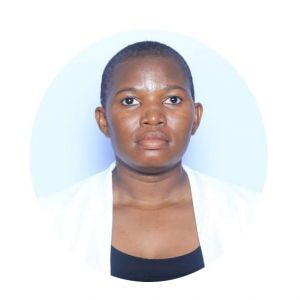
Artist in Residency
University of Dar es Salaam
Safina Kimbokota is a permanent artist in residence at the Department of Creative Arts at the University of Dar-es Es-Salaam. She is a contemporary sculptress; she does metal sculptures that she’s skillfully mixed with fabric along with painting. Her previous figurines highlight social pressure facing young women in Africa there by encouraging campaigns against harmful skin bleaching cosmetics and health –care rights within her community and Africa at large. Social media and fashion trends reflecting issues related to body image and self-esteem inspired her art work. Safina also incorporates recycled materials in her artworks to bring awareness on environmental pollution. Her mixed media sculptures are made of recycled materials such as metal scraps, Plastic and African fabric she collects from scraps warehouse and the African fabric used is waste collected from the dressmakers’ shops. After welding she stitched and wove the figure with the popular Swahili fabric ‘Kitenge’ transforming it into a graceful black African woman. “Many African women don’t appreciate their natural beauty and they spend a lot of their money trying to look like white women.”
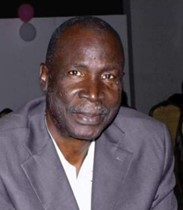
Head of Multimedia Department
Conservatoire des Arts et Métiers Multimedia
Mamadou Habib BALLO is a graduate of the National Institute of Arts (INA). In 1981, he obtained a scholarship for Moscow. He entered the Surikov State Institute of Painting and enrolled in the Faculty of Graphic Arts, specializing in "illustration".
After 6 years, he graduated with a "Master of Fine Art" diploma. Back in Mali Habib BALLO will teach drawing and painting at the National Institute of Arts while taking care of his artistic creations. He worked in development programs as a graphic designer and was Deputy Director General of the Palace of Culture from 2003 to 2005. Since 2005 Habib BALLO has held the position of Head of Multimedia Department at the Conservatoire des Arts et Métiers Multimedia Balla Fasseké Kouyaté, before retiring in 2019.
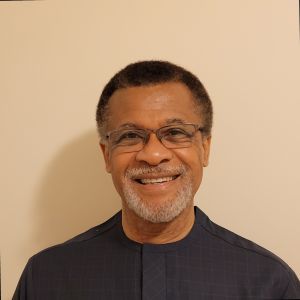
Associate Professor, Theatre Studies
Michigan State University
Philip Uko Effiong has been teaching at the college level for over 20 years and holds a PhD in Drama from the University of Wisconsin at Madison. He is currently a Professor of Theatre Studies at Michigan State University (MSU). Prior to joining MSU in 2017, Philip taught courses in the humanities at various Nigerian, Ghanaian, and American universities. In addition to a book on African American drama, his articles on topics in the humanities appear in various journals and encyclopedias.
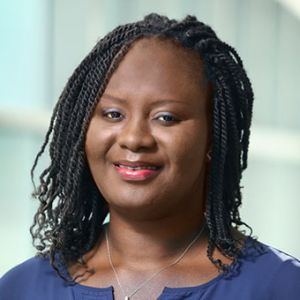
Closing Remarks
Assistant Professor, Dept of English
Brandeis University
Anglophone and Francophone African literature; Caribbean literature; critical theory; film/media; gender and sexuality studies; postcolonial theory and literature.
"Movement of the Female Body: Re-imagining Black Diasporic Women’s Writings." In "New Frontiers in the Study of the Global African Diaspora: Between Unchartered Themes and Alternative Representations." Edited by Glenn Chambers, R. Kiki Edozie, and Tama Hamilton-Wray. MSU Press, Forthcoming 2017.
"I Just Wanted To Forget It All. But It Was Impossible:" Umutesi and the Politics of Testimony in Surviving the Slaughter: The Ordeal of a Rwandan Refugee in Zaire." In "Under Fire: Critical Discourses on African Women in War and Conflict." Edited by Pauline Ada Uwakweh. Lexington Books, 2016.
Refugee Stories, Refugee Lives (ENG 52a)
Documentary: Techniques and Controversies (ENG 62a)
Women and War (ENG 137b)
The Globalization of Nollywood (ENG 170a)
Art is a reflection, a mental representation of an object, an idea, or a concept whether it be abstract or concrete. Therefore, when we pass any judgment on a work of art based on the image or the idea that we have of this object and outside of its historical, geographical, social, or ethnic context, it is likely that this will be a subjective judgment and often based on prejudices. This applies to concrete subjects as well as abstract ones such as war or peace. Even if these concepts (war and peace) seem to be universal and global "humanitarian or humanist" concerns, perceptions of them are often contradictory and based on circumstances considered fatalistic and rigid of "the assaulted" or "the aggressor" based on the viewer’s particular context. The Berlin Wall is a perfect illustration of this. It is viewed differently by Western Europe (as a “wall of shame”) and Russia (as a “wall of peace”). Unfortunately, contemporary artistic production on the African continent, is often focused on and reflects fixed concepts and structures "imposed" by the West. It no longer responds to the aesthetic concerns of the populations who, in principle, should generate it. The African public, during exhibitions of paintings or artistic performances presented by their African peers, finds itself in the turmoil of deciphering iconographic codes out of context. The questions we will explore and interrogate in this dialogue are, what role does art play in African peace movements? How and why do forms of social consciousness in Africa necessarily reflect Western aesthetic categories? How might these be contextualized within African arts for the African public? How might African art drive global conceptions of peace? This panel will bring together specialists focused on art and peace within Africa. This subject is especially timely given the current context of global upheaval.